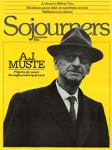The following excerpt is from the conclusion of Muste's essay "Of Holy Disobedience." First published in 1952, the essay was primarily concerned with the debate among pacifists at that time over the appropriate degree of cooperation with the peace-time draft. This excerpt is from The Essays of A.J. Muste, edited by Nat Hentoff and is used by permission of the publisher, Simon and Schuster.—The Editors
Non-conformity, Holy Disobedience, becomes a virtue, indeed a necessary and indispensible measure of spiritual self-preservation, in a day when the impulse to conform, to acquiesce, to go along, is used as an instrument to subject men to totalitarian rule and involve them in permanent war. To create the impression of at least outward unanimity, the impression that there is no "real" opposition, is something for which all dictators and military leaders strive. The more it seems that there is no opposition, the less worthwhile it seems to an ever larger number of people to cherish even the thought of opposition.
Surely, in such a situation, it is important not to place the pinch of incense before Caesar's image, not to make the gesture of conformity which is required, let us say, by registering under a military conscription law; it is surely neither right nor wise to wait until the "system" has driven us into a corner where we cannot retain a vestige of self-respect unless we say No. It does not seem wise or right to wait until this evil catches up with us, but rather to go out and meet it—to resist—before it has gone any further.
Thus to embrace Holy Disobedience is not to substitute resistance for reconciliation. It is to practice both reconciliation and resistance. In so far as we help to build up or smooth the way for American militarism and the regimentation which accompanies it, we certainly are not practicing reconciliation toward the millions of people against whom American war preparations, including conscription, are directed. Nor are we practicing reconciliation toward the hundreds of millions in Asia and Africa whom we condemn to poverty and drive into the arms of Communism by our addiction to military "defense." Nor are we practicing love toward our own fellow citizens, including the multitude of youths in the armed services, if, against our deepest insight, we help to fasten the chains of conscription and war upon them.
The gospel of reconciliation will be preached with a new freedom and power when the preachers have broken decisively with American militarism ... When we have gotten off the back of what someone has called the "wild elephant" of militarism and conscription on to the solid ground of freedom, and only then, we will be able to live and work constructively. Like Abraham, we shall have to depart from the city-which-is in order that we may help to build the city-which-is-to-be, whose true builder and maker is God.
Finally it is of crucial importance that we should understand that for the individual to pit himself in Holy Disobedience against the war-making and conscripting state, wherever it or he be located, is not an act of despair or defeatism. Rather, I think we may say that precisely this individual refusal to "go along" is now the beginning and the core of any realistic and practical movement against war and for a more peaceful and brotherly world. For it becomes daily clearer that political and military leaders pay virtually no attention to protests against current foreign policy and pleas for peace since they know quite well that, when it comes to a show-down, all but a handful of the millions of protesters will "go along" with the war to which the policy leads.
The failure of the policymakers to change their course does not, save perhaps in very rare instances, mean that they are evil men who want war. They feel, as indeed they so often declare in crucial moments, that the issues are so complicated, the forces arrayed against them so strong, that they "have no choice" but to add another score of billions to the military budget, and so on and on. Why should they think there is any reality, hope or salvation in "peace advocates" who, when the moment of decision comes, also act on the assumption that they "have no choice" but to conform?
Precisely on that day when the individual appears to be utterly hopeless, to "have no choice," ... there is absolutely no hope save in going back to the beginning. The human being, the child of God, must assert his humanity and his sonship again. He must exercise the choice which no longer is accorded him by society, which, "naked, weaponless, armourless, without shield or spear, but only with naked hands and open eyes," he must create again. He must understand that this naked human being is the one real thing in the face of the machines and the mechanized institutions of our age. He, by the grace of God, is the seed of all the human life there will be on earth, though he may have to die to make that harvest possible.

Got something to say about what you're reading? We value your feedback!
